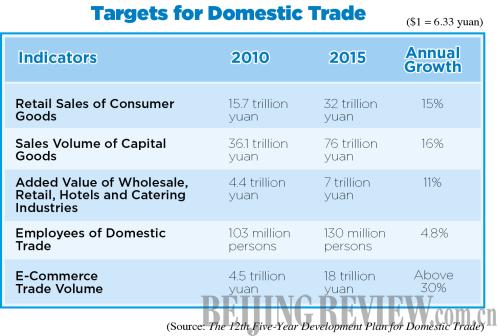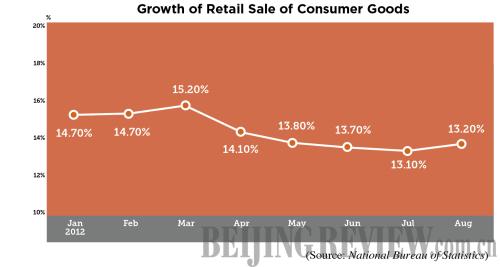|
Zhang, a press editor, earns 6,000 yuan ($950) a month, a fairly high income in Beijing. But he still puts half his salary in the bank, even when interest rates have been lower than the rate of inflation during the last two years.
Each year Zhang travels once with his family within China, which is his highest expenditure for the year, and the family eats out once or twice a month. He said he won't dare spend his money on big purchase items, although he would like to replace his Lenovo computer for an iMac, change his Volkswagen Bora for a BMW and bring his family to the Great Lakes in North America and the Triumphal Arch of France. Zhang said his savings will be used for his son's education and for other urgent needs first.
In China, many people live the same life as Zhang and have similar ideas in spending.
"To promote domestic consumption, an important problem is whether personal income can be raised," said Zhao Xianwei, a macroeconomic researcher at Galaxy Futures Co. Ltd. "The government would first need to raise residents' income remarkably."
Zhao Ping, Deputy Director of the Department of Consumption Economy Studies of Chinese Academy of International Trade and Economic Cooperation, said the new government initiative would accelerate plans to increase residents' income, improve social security and readjust the consumption tax.
"China is likely to redouble the efforts in stimulating consumption," Zhao said. "The country may readjust the taxation of items and the structure of the consumption tax, such as changing the tax rates on some commodities such as automobiles, cosmetics and jewelry. To some consumer packaged goods that used to be luxuries, the government may lower the tax rate or even exempt those items from a consumption tax."
Zhao said for some government-supported key products or services, the country may consider adopting a way of collecting consumption tax and then refunding it. If consumers buy these products or services with consumption loans, the government may consider expanding consumption by offering discount loans.
If the social safety net is completed, consumption will grow substantially, which could pick up the slack from lower consumption in developed markets, said Zhao.
Problems to be tackled
Zhao Xianwei believes that in order to accomplish the goals set out in the plan, it must do three things.
The first is to balance development in different regional markets when promoting domestic trade, which has been a nagging problem confronting China since its opening up to the world over 30 years ago. Since then, China's economic and social development has been unbalanced, with growing development in the eastern regions and urban areas but slower development in the western regions and rural areas. Consumption patterns and inter-regional trade are also unbalanced.
"For better development of domestic trade in the future, China needs to coordinate development among different regions," Zhao said.
The second problem is logistics. In order to balance development among different regions, China must improve its entire logistics network in order to cut costs.
The third is to find a way to ensure stable prices at the domestic market. Amid fluctuations of prices for bulk commodities on the international market, it is difficult to stabilize domestic prices through macro-control measures. "If there is a stable mechanism on our consumption market, we can, together with the financial market, influence the prices of bulk commodities," Zhao said. "This is what should and can be solved in the future."


Email us at: lanxinzhen@bjreview.com | 